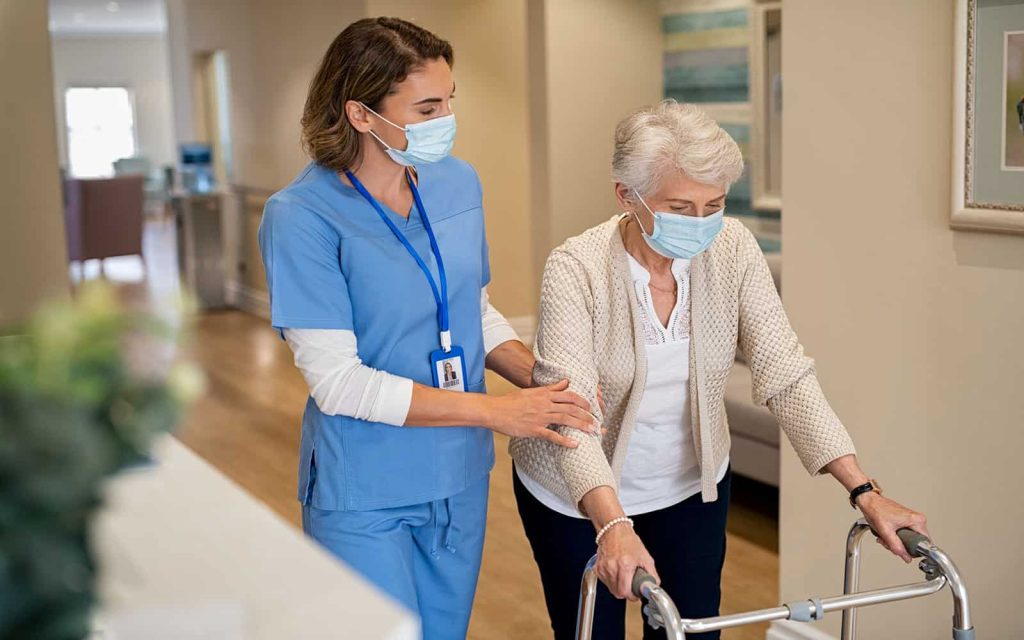What Does a Leader in Aged Care Nursing Do?
Leadership roles in aged care nursing combine clinical expertise with managerial acumen to improve geriatric patient outcomes. These professionals oversee care delivery in settings like residential facilities, hospitals, and community health programs, focusing on chronic disease management, palliative care, and staff mentorship. In Leadership role aged care nurses are about more than just providing hands-on patient care—they involve guiding teams, setting strategic goals, and ensuring the delivery of high-quality care to elderly patients. These nurses hold the responsibility of managing healthcare facilities, coordinating care strategies, and advocating for patient needs while also mentoring and developing the next generation of nurses. They work closely with multidisciplinary teams to improve the overall quality of care and patient outcomes in geriatric settings.

Did you know that 72% of nurses in leadership roles in aged care report a high level of job satisfaction due to their ability to make a real difference in their teams and patient care? If you’re passionate about shaping the future of healthcare and improving the lives of the elderly, a leadership role in aged care might be exactly what you’re looking for.
Types of Leadership Roles in Aged Care Nursing
Core Responsibilities & Daily Tasks
Aged care nurse leaders coordinate multidisciplinary teams, advocate for patient dignity, and implement policies to enhance care standards. Daily tasks include:
- Conducting care plan reviews.
- Mentoring junior staff.
- Managing budgets and resources.
- Manage nursing teams and ensure high standards of care.
- Develop and implement care strategies for elderly patients with chronic illnesses or complex medical needs.
- Advocate for policies that improve patient outcomes and enhance service delivery.
- Coordinate interdisciplinary teams, ensuring that all medical and support staff work together to provide holistic care.
These roles require a blend of clinical expertise, leadership skills, and a deep understanding of the healthcare needs of the elderly. Leadership roles also involve decision-making responsibilities, including budget management and compliance with regulatory standards.
Did you know? Approximately 85% of aged care nurses in Australia work in residential facilities, but leadership roles can also be found in hospitals, home care services, and hospice care settings, offering a variety of environments to thrive in.
Specializations & Niche Opportunities
Leadership roles in aged care nursing are diverse and often come with specialized niches. Here are a few examples of roles you might pursue:

| Specialization | Key Skills | Work Settings |
|---|---|---|
| Clinical Nurse Consultant | Policy development, gerontology | Hospitals, government agencies |
| Nurse Educator | Curriculum design, adult learning | Universities, training centers |
| Palliative Care Coordinator | Pain management, family liaison | Hospices, community health |
Each specialization comes with its own unique challenges, whether it’s managing the operational side of healthcare or being at the forefront of clinical care for elderly patients.
Career Pathways
Entry-Level to Leadership Roles
Becoming a leader in aged care nursing typically involves several stages of progression. Here’s a typical career path:
- Entry-Level: Enrolled Nurse (Diploma of Nursing).
- Mid-Career: Registered Nurse (Bachelor of Nursing + AHPRA registration).
- Leadership: Nurse Unit Manager (Master of Health Administration).
Leadership roles can also be reached through specialization, such as obtaining qualifications in palliative care, geriatrics, or nursing management. These advanced qualifications will increase your opportunities to transition into senior positions.
Advanced Specializations
Specializing in certain areas of nursing can accelerate your journey to leadership. Key advanced specializations include:
- Gerontology Nurse Practitioner: Requires a Master of Nursing (Aged Care).
- Director of Nursing: Oversees facility operations; average salary: $140,000 AUD in Sydney.
- Critical Care Nursing: Managing high-acuity patients.
- Clinical Nurse Educator: Focuses on teaching and mentoring future generations of nurses.
- Palliative Care Nurse Leader: Expert in end-of-life care management.
A nurse in a leadership role, especially as a Nurse Practitioner or Clinical Nurse Specialist, often earns a 35% higher salary than a regular RN in cities like Sydney.
Salary & Benefits
Average Salary by Experience & Location
Leadership roles in aged care nursing offer competitive salaries, depending on experience and location. Here’s a breakdown of what you might expect
| City | Entry-Level Salary | Senior-Level Salary |
|---|---|---|
| Sydney | $85,000 AUD | $135,000 AUD |
| Melbourne | $82,000 AUD | $130,000 AUD |
| Brisbane | $80,000 AUD | $125,000 AUD |
Benefits Beyond Pay
Beyond the attractive salaries, leadership roles come with various perks, including:
- Professional development: Sponsorship for certifications like Dementia Care.
- Work-life balance: 6 weeks of annual leave in public sectors (e.g., Queensland Health)
- Shift differentials for night or weekend work
- Tuition reimbursement to help fund your continued education
- Pension plans and generous retirement benefits
Example: Nurses in public hospitals in Brisbane receive 6 weeks of annual leave, providing the perfect work-life balance.
Education & Certification
Required Qualifications
To become an effective leader in aged care nursing, you’ll need specific qualifications, such as:
- RN Registration: Bachelor of Nursing + AHPRA license.
- Leadership Roles: Graduate Certificate in Aged Care Leadership.
- Leadership/Management: Master of Healthcare Administration or Nursing Leadership Certification
For specialized leadership roles like Palliative Care Nurse Leader or Clinical Nurse Educator, additional certifications in those areas will be essential.
Top Certifications
Pursuing advanced certifications can set you apart in leadership roles. Some top certifications to consider include:
- Advanced Life Support (ALS)
- Clinical Nurse Leadership Certification
- Palliative Care Certification
These certifications provide not only clinical expertise but also leadership and management skills essential for handling complex healthcare teams.
Work Environment
Facility vs. Community Leadership
Leadership roles in aged care nursing can be found in both hospital and community settings:
- Hospitals: These settings tend to be fast-paced, with higher stakes in managing critical patients. Leadership roles often involve overseeing teams in specialized units such as geriatrics or palliative care.
- Facility: Fast-paced, team management in residential care.
- Community Settings: More relaxed, community-based environments might involve managing care for elderly patients at home, in nursing homes, or through outreach programs.
Case Study: ” A Nurse Manager in a rural community might oversee a team that provides in-home care, requiring not only leadership skills but also the ability to manage resources efficiently and provide training to staff in remote areas. A day in the life of a Nurse Manager at a Sydney aged care home: Balancing staff training and resident care.”
Challenges & Rewards
While the rewards of leadership in aged care nursing are immense, the role comes with challenges:
- Emotional resilience: Caring for the elderly can be emotionally demanding, especially when managing end-of-life care or chronic conditions.
- Challenges: Emotional resilience during end-of-life care.
- Workload management: Senior positions often come with the pressure of ensuring teams are functioning effectively, which can result in burnout if not managed properly.
- Rewards: Improving dementia care protocols industry-wide.
60% of ICU nurses report moderate-to-high burnout rates, and managing a team in aged care can be just as stressful. Leaders must balance patient care with the health and well-being of their staff.
Job Application Process
Resume & Interview Tips
When applying for leadership roles, make sure your resume highlights your management skills, leadership experience, and specialized clinical competencies. Focus on accomplishments like team management, process improvements, and patient outcomes. Be prepared to answer STAR-method questions during interviews, such as: “Tell us about a time you led a team through a challenging healthcare situation.”
- Resume Keywords: “Clinical governance,” “staff development,” “aged care accreditation.”
- STAR Example: “Describe a time you resolved a conflict within your team.”
Licensing & Registration
To qualify for leadership roles, ensure that you meet these basic requirements:
- AHPRA registration renewal every year.
- NDIS Worker Screening Check for community roles.
Regional Opportunities
Demand in Key Cities
Certain cities have higher demand for leadership roles in aged care due to the aging population and growing healthcare needs:
- Melbourne: 15% growth in dementia care leadership roles.
- Sydney: High demand for nurse managers and clinical educators, especially in large hospitals and residential facilities.
- Adelaide: Incentives for rural aged care nurse managers.
- Brisbane: Significant growth in leadership roles as the demand for aged care services increases due to an aging population.
Rural vs. Urban Roles
Rural areas may offer more attractive incentives, such as relocation assistance or higher salaries, due to the need for healthcare leaders in less-populated areas.
- Rural: Higher salaries (+$10,000 AUD) and relocation bonuses.
- Urban: Opportunities in research and policy development.
Is a Leadership Role in Aged Care Nursing Right for You?

Leadership in aged care nursing is both rewarding and challenging. It offers the opportunity to make a lasting impact on the lives of elderly patients while guiding and mentoring the next generation of nurses. If you’re passionate about nursing, leadership, and improving patient outcomes, this career path might be the right choice for you.